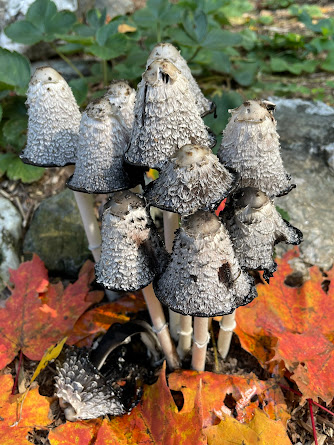October 13.
October 13, 2021
Drizzling, misty showers still, with a little misty sunshine at intervals.
The trees have lost many of their leaves in the last twenty-four hours.
The sun has got so low that it will do to let his rays in on the earth; the cattle do not need their shade now, nor men. Warmth is more desirable now than shade.
The alert and energetic man leads a more intellectual life in winter than in summer.
Mr. Pratt told me that Jonas? Melvin found a honey-bee's nest lately near Beck Stow's swamp with twenty-five pounds of honey in it, in the top of a maple tree which was blown down.
There is now a large swarm in the meeting-house chimney, in a flue not used.
Many swarms have gone off that have not been heard from.
H. D. Thoreau, Journal, October 13, 1851
The sun has got so low that it will do to let his rays in on the earth; the cattle do not need their shade now, nor men. Warmth is more desirable now than shade.
The alert and energetic man leads a more intellectual life in winter than in summer.
- In summer the animal and vegetable in him are perfected as in a torrid zone; he lives in his senses mainly.
- In winter cold reason and not warm passion has her sway; he lives in thought and reflection; he lives a more spiritual, a less sensual, life.
- If he has passed a merely sensual summer, he passes his winter in a torpid state like some reptiles and other animals.
- The mind of man in the two seasons is like the atmosphere of summer compared with the atmosphere of winter.
- He depends more on himself in winter, — on his own resources, — less on outward aid.
- Insects, it is true, disappear for the most part, and those animals which depend upon them; but the nobler animals abide with man the severity of winter.
- He migrates into his mind, to perpetual summer.
- And to the healthy man the winter of his discontent never comes.
Mr. Pratt told me that Jonas? Melvin found a honey-bee's nest lately near Beck Stow's swamp with twenty-five pounds of honey in it, in the top of a maple tree which was blown down.
There is now a large swarm in the meeting-house chimney, in a flue not used.
Many swarms have gone off that have not been heard from.
H. D. Thoreau, Journal, October 13, 1851
Man in winter. See December 8, 1850 ( "The dear privacy and retirement and solitude which winter makes possible!"); October 27, 1851 ("The cold numbs my fingers. Winter, with its inwardness, is upon us. A man is constrained to sit down, and to think."); January 17, 1852 ("In proportion as I have celestial thoughts, is the necessity for me to be out and behold the western sky sunset these winter days. That is the symbol of the unclouded mind that knows neither winter nor summer ") April 1, 1852 ("We have had a good solid winter, which has put the previous summer far behind us; intense cold, deep and lasting snows, and clear, tense winter sky. It is a good experience to have gone through with."); January 30, 1854 ("The winter was made to concentrate and harden and mature the kernel of man's brain, to give tone and firmness and consistency to his thought. This harvest of thought the great harvest of the year. The human brain is the kernel which the winter itself matures. Now we burn with a purer flame like the stars."); December 5, 1856 ("I love the winter, with its imprisonment and its cold,"); December 11, 1855 ("The winter, with its snow and ice, . . . is as it was designed and made to be.")
October 13. See A Book of the Seasons, by Henry Thoreau, October 13
A Book of the Seasons, by Henry Thoreau,
A Book of the Seasons, by Henry Thoreau
"A book, each page written in its own season,out-of-doors, in its own locality.”
~edited, assembled and rewritten by zphx © 2009-2024




No comments:
Post a Comment